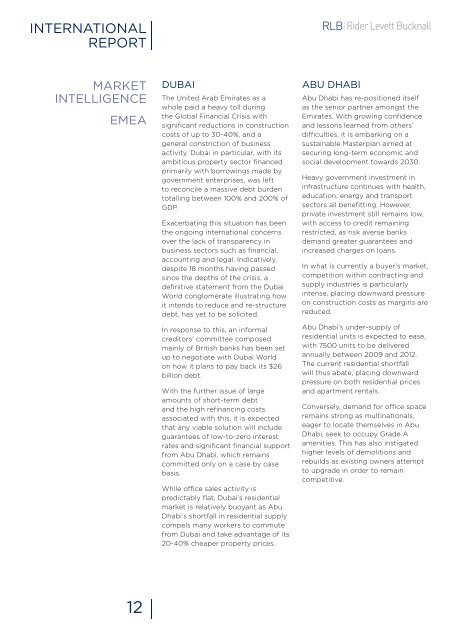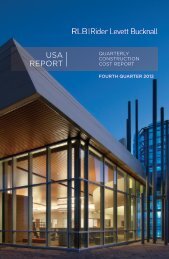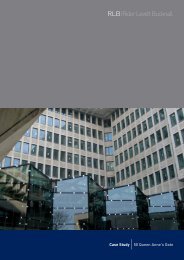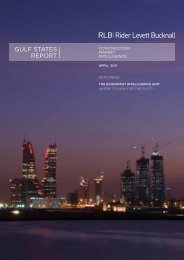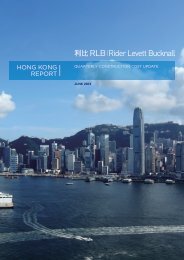Download... - Rider Levett Bucknall
Download... - Rider Levett Bucknall
Download... - Rider Levett Bucknall
Create successful ePaper yourself
Turn your PDF publications into a flip-book with our unique Google optimized e-Paper software.
INTERNATIONAL<br />
REPORT<br />
MARKET<br />
INTELLIGENCE<br />
EMEA<br />
Dubai<br />
The United Arab Emirates as a<br />
whole paid a heavy toll during<br />
the Global Financial Crisis with<br />
significant reductions in construction<br />
costs of up to 30-40%, and a<br />
general constriction of business<br />
activity. Dubai in particular, with its<br />
ambitious property sector financed<br />
primarily with borrowings made by<br />
government enterprises, was left<br />
to reconcile a massive debt burden<br />
totalling between 100% and 200% of<br />
GDP.<br />
Exacerbating this situation has been<br />
the ongoing international concerns<br />
over the lack of transparency in<br />
business sectors such as financial,<br />
accounting and legal. Indicatively,<br />
despite 18 months having passed<br />
since the depths of the crisis, a<br />
definitive statement from the Dubai<br />
World conglomerate illustrating how<br />
it intends to reduce and re-structure<br />
debt, has yet to be solicited.<br />
In response to this, an informal<br />
creditors' committee composed<br />
mainly of British banks has been set<br />
up to negotiate with Dubai World<br />
on how it plans to pay back its $26<br />
billion debt.<br />
With the further issue of large<br />
amounts of short-term debt<br />
and the high refinancing costs<br />
associated with this, it is expected<br />
that any viable solution will include<br />
guarantees of low-to-zero interest<br />
rates and significant financial support<br />
from Abu Dhabi, which remains<br />
committed only on a case by case<br />
basis.<br />
While office sales activity is<br />
predictably flat, Dubai’s residential<br />
market is relatively buoyant as Abu<br />
Dhabi’s shortfall in residential supply<br />
compels many workers to commute<br />
from Dubai and take advantage of its<br />
20-40% cheaper property prices.<br />
Abu Dhabi<br />
Abu Dhabi has re-positioned itself<br />
as the senior partner amongst the<br />
Emirates. With growing confidence<br />
and lessons learned from others’<br />
difficulties, it is embarking on a<br />
sustainable Masterplan aimed at<br />
securing long-term economic and<br />
social development towards 2030.<br />
Heavy government investment in<br />
infrastructure continues with health,<br />
education, energy and transport<br />
sectors all benefitting. However,<br />
private investment still remains low,<br />
with access to credit remaining<br />
restricted, as risk averse banks<br />
demand greater guarantees and<br />
increased charges on loans.<br />
In what is currently a buyer’s market,<br />
competition within contracting and<br />
supply industries is particularly<br />
intense, placing downward pressure<br />
on construction costs as margins are<br />
reduced.<br />
Abu Dhabi’s under-supply of<br />
residential units is expected to ease,<br />
with 7500 units to be delivered<br />
annually between 2009 and 2012.<br />
The current residential shortfall<br />
will thus abate, placing downward<br />
pressure on both residential prices<br />
and apartment rentals.<br />
Conversely, demand for office space<br />
remains strong as multinationals,<br />
eager to locate themselves in Abu<br />
Dhabi, seek to occupy Grade A<br />
amenities. This has also instigated<br />
higher levels of demolitions and<br />
rebuilds as existing owners attempt<br />
to upgrade in order to remain<br />
competitive.<br />
12


